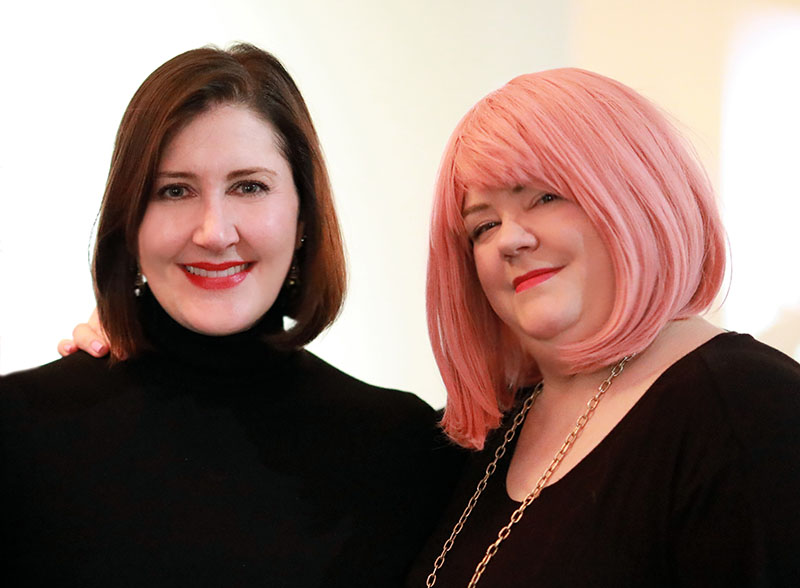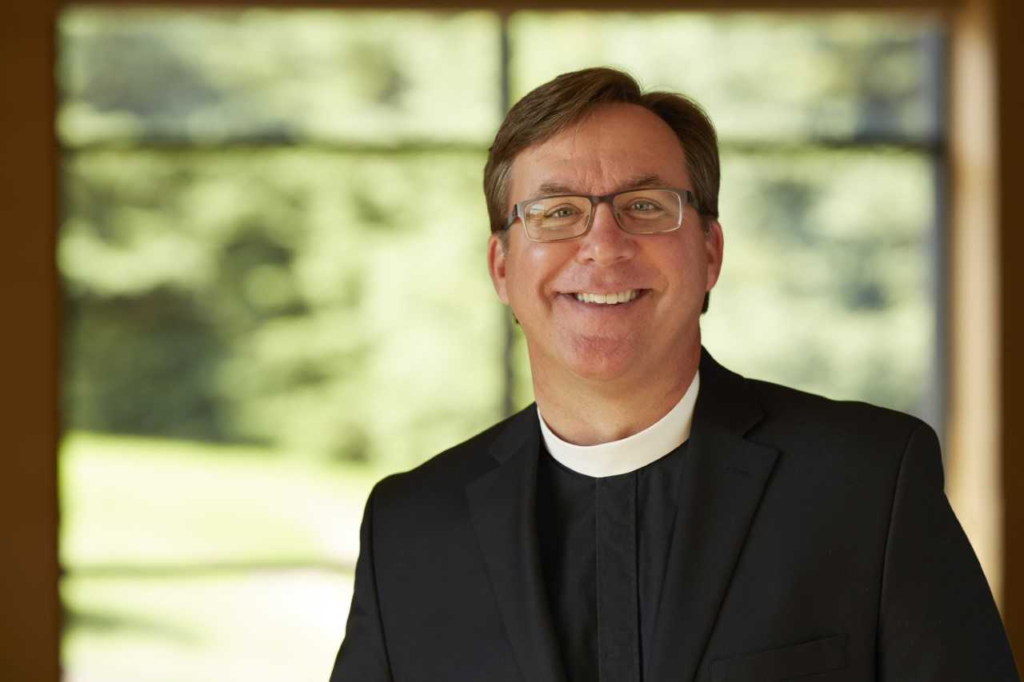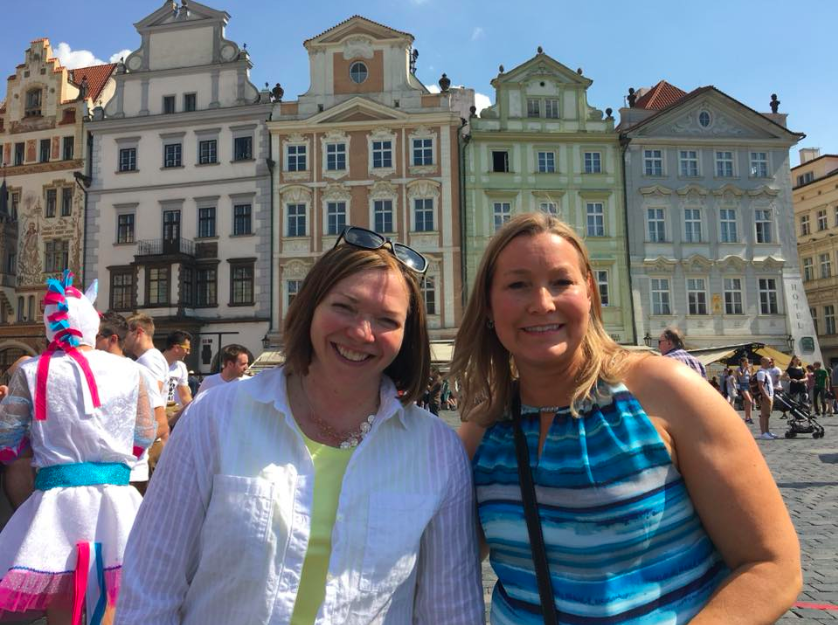“I’m done with agency life. It’s too many hours, too stressful and I have other things I’d like to do.”
It’s a conversation I’ve had with more than a few friends and colleagues over the years. You could replace “agency life” with “corporate life” and insert a whole other sub-set of people, too.
Truth is: Working in the PR/comms/social world isn’t easy.
It’s stressful–reports consistently have PR/comms/social in the top 10 most stressful jobs, seemingly, year after year.
It doesn’t pay as well as other fields–I usually don’t see PR/comms/social in the top-paying jobs posts.
And, for many people, it just doesn’t leave us fulfilled the way jobs in the education, health care and non-profit worlds do.
So, sometimes people start talking about finding a job in another industry. Now, I would say typically, those conversations are just that–conversations. Many people TALK about quitting the PR/comms/social field, but the truth is very few do.
But, these three people did.
Kelly Groehler, Tim Westermeyer and Betsy Andersen all traded in their corporate and agency PR careers for work in another field. And, they haven’t looked back since.
Today, I thought it would be interesting to look at what these folks do now, why these three made the switch, and what they enjoy most about their new careers.
Kelly Groehler
Former role: Vice president of communications and public affairs with Berkshire Hathaway Energy (BHE)
Current role: Co-founder and CEO of a women’s apparel startup, Alice Riot LLC

What was your last PR job? What was the last date you worked in the PR field?
I resigned my last full-time PR job in December 2014, as vice president of communications and public affairs with Berkshire Hathaway Energy (BHE).
How long did you work in the PR field?
Full time, nearly 22 years. I’ve since continued to work part-time in the PR space, mainly with a handful of client engagements as an independent strategist. I’m also a consultant to Sprosty Network, and we’ve together worked over two years to build the brand for its RetailXelerator (RX) program (an innovation pipeline program for major corporations). Combined with Alice Riot, it’s a pretty full work portfolio.
What do you do now (specific job and responsibilities)? How long have you been in this job/field?
I’m co-founder and CEO of a women’s apparel startup, Alice Riot LLC. Alice Riot is a line of professional women’s garments that serve as the canvases for limited-edition prints of original works by female artists. I’m mainly responsible for the business operations side of Alice Riot: sourcing, finance, legal, etc. Both Kate and I have strong PR backgrounds, but the responsibility falls within her scope as Chief Creative Officer (obviously with a ton of my input and social chatter). We worked through Studio/E, a killer entrepreneurial program, to build the business plan and vision, and have bootstrapped the business-building phase of Alice Riot over the past two years. We wrapped an Indiegogo campaign this spring, which helped us build an initial base of pre-order customers, and plan to fully launch our online store and retail tests this summer.
What drove your decision to look outside the PR field for employment?
It was a long-emerging moment of authenticity, thanks in part to encouragement from the right people – namely, Rick Rommel at Sprosty Network, and both Tammy Lee at Recombinetics and Nate Garvis, a longtime mentor and co-founder of Studio/E (Tammy nominated me for the program). They all knew that I had no interest in returning to a corporate role. The Sprosty opportunity put me in a position to learn immensely from other startups and retailers, and Studio/E provided the space to explore the idea of following my true passions: art, professional fashion, and women in leadership. Alice Riot is our bet that we can grow this startup into a profitable business anchored in all three of those passions.
What do you miss most about working in PR?
I miss the issues and reputation management work, especially on corporate responsibility issues. I’ve always said that I’m a lousy PR type, in that I’m always looking for the downside or risk that we could preempt with stakeholders. I do have days where I obsess over business headlines, and wonder how the teams on the inside are navigating the stakeholder conversations. I’ve brought plenty of that issues management sentiment over to the Alice Riot work – I even hosted a working lunch early on with Kate and our attorney, with a theme: “What could go wrong?”
What do you enjoy most about your new job?
Prior to Alice Riot, I had zero background in fashion or apparel. I’m learning so much – every day feels like a leap into the unknown. I’ve also learned that those 22 years inside corporate and agency settings created huge wells of experience and networks that have paid off while we build this business. We’re just getting started, and yet it’s already the most exciting, terrifying and rewarding experience I’ve ever had.
What were the biggest considerations you had to make when switching careers (salary, training, etc.)? Why?
- Communication with my husband. He’s been a huge champion of this career shift, and we need to stay aligned on the practical details of paying the bills and managing our investments, since cash flow is very different compared to a W2 (steady paycheck) scenario.
- Fighting the urge to go back to that W2 life, just so the taxes and benefits are handled by an employer.
- Entrepreneurial thinking. I’m so glad I went with the Studio/E option over an MBA (I call it the “anti-MBA”). I love the idea of working each day with an explorer’s mindset.
Tim Westermeyer
Former role: Account Group Director at Weber Shandwick
Current role: Senior Pastor of St. Philip the Deacon, a large Lutheran congregation in Plymouth, Minnesota

What was your last PR job? Account Group Director at Weber Shandwick. At least I think that was my last title — it’s been a while.
What was the last date you worked in the PR field? Fall of 2002.
How long did you work in the PR field? Ten years.
What do you do now (specific job and responsibilities)? I’m the Senior Pastor of St. Philip the Deacon, a large Lutheran congregation in Plymouth, Minnesota. My responsibilities include pastoral duties like preaching, teaching, conducting baptisms, weddings and funerals, as well as long-range strategic planning, oversight of staff, and encouraging lives of generosity and service. Given my background in PR, it will not be a surprise that how the church communicates — everything from our website to social media to what the bulletins and signage looks like — is also a major priority for me.
How long have you been in this job/field? Since the fall of 2002. I believe I began my first call as a pastor within a week or two of leaving Weber Shandwick.
What drove your decision to look outside the PR field for employment? That’s hard to answer in a few short words or sentences, in part because I really loved the world of PR. I especially appreciated all of the smart, talented and conscientious professionals I had the privilege to work alongside of — Sara Gavin, Dave Mona, Dennis McGrath, Scott Meyer, Chris Malecek, Kari Bjorhus, Mary Milla and Patricia Henning, just to name a few. In the end, though — and, again, this is what’s hard to articulate briefly or concisely — I ultimately felt called to the work of pastoral ministry. I suppose another way of saying that is that I felt that pastoral ministry is what I was made for — what I was supposed to do with my life.
What do you miss most about working in PR? Probably the people. Again, I felt incredibly privileged to learn from and work with all kinds of gifted, smart and good people in PR. I remain friends with many of them, and am grateful for those relationships. I suppose I also miss the wide variety of kinds of work I got to do in PR since my career was entirely on the agency side.
What do you enjoy most about your new job? First of all, I guess, would be a profound sense of humility and gratitude that I’m doing what I believe I was made to do — that I am able to use whatever limited gifts and skills and abilities I have to do work that I find meaningful and important and valuable, and which points to something bigger and more significant than me. Second, I love that lessons I learned during my years in PR are, in all kinds of ways, directly applicable to the work of parish ministry. Effective communications is a hugely important part of ministry — whether you’re talking about the craft of preaching, or leading a Bible study, or arguing in a winsome way for the truth of faith in a culture that is sometimes cynical or jaded about such things, or trying to distill and articulate where God might be inviting us a congregation to go as we dream together about our future. Finally, I am grateful that — like the agency world — the work of parish ministry is almost infinitely varied. As a result, there are always new challenges and opportunities, which keeps the work fresh and interesting.
What were the biggest considerations you had to make when switching careers (salary, training, etc.)? Why? Again, there isn’t really a short answer to a question like this. My transition from the agency world to the life of a parish minister took six or seven years, during which time I probably fretted and obsessed over just about every conceivable question imaginable. How could I possibly walk away from a good job? How would we as a family adjust to my major cut in pay? How would our children respond and react to having a dad who was a pastor? How would the unusual hours of parish ministry — including weekends and evenings — impact our life? In the end — now that I’m sixteen years removed from my move from PR to ministry, I can say two things with great confidence: 1. I wouldn’t trade my years of PR for anything; and 2. I can’t imagine doing anything else than what I’m doing now.
Betsy Andersen
Former role: Account Supervisor, Fleishman Hillard
Current role: Full-time faculty member at the University of Minnesota – Hubbard School of Journalism & Mass Communication

What was your last PR job? What was the last date you worked in the PR field?
The funny thing is, since I’m a PR professor, I still think I work in PR. But technically, I left my agency job to go back to grad school in 2001 (the week before Sept. 11). I did go back to work at Fleishman Hillard for a summer while in grad school (2004).
How long did you work in the PR field?
Five years.
What do you do now (specific job and responsibilities)? How long have you been in this job/field?
I’m a full-time faculty member at the University of Minnesota – Hubbard School of Journalism & Mass Communication. I teach 5-6 courses per year, such as Digital Content, Strategic Communication Writing, and Digital Strategy; conduct research about social media-related topics; and serve on several committees regarding our undergraduate curriculum, scholarships, hiring committees, etc. Somehow, it doesn’t look too demanding on paper, but it’s intense during the school year. I’m always just as exhausted at the end of every semester as I was in college. But there’s also that same sense of accomplishment when you look back at what you’ve done over the past 15 weeks.
What drove your decision to look outside the PR field for employment?
I was inspired by my own favorite professor in college, and always knew this was something I wanted to pursue. I decided that I should spend five years learning in the field before trying to teach about it – so I set that as my goal.
What do you miss most about working in PR?
Definitely the friends and amazing people I worked with. I still am able to connect with the PR community through involvement with PRSA, bringing in classroom guests, coffee, etc., but you definitely bond with a team when you’re working on a challenging, but rewarding project deadline together.
What do you enjoy most about your new job?
I’m highly motivated by learning new things, so I love that I’m able to choose – for the most part – what types of classes to teach, activities and assignments to create, and research to conduct. The fact that the industry continues to change so quickly requires a large time investment, but it’s also fun to keep things new and fresh. I also work with great colleagues and students. One of my favorite things is helping students figure out what type of career they’re really excited about, and suggesting a next step if I can, such as an informational interview or internship opportunity. It’s exciting to watch students go from finding their first internship at the beginning of your course to becoming a successful professional after graduation. I also do work in the summer – but I definitely like that it’s a much more relaxed pace and I can work from a coffee shop or home during that time of the year.
What were the biggest considerations you had to make when switching careers (salary, training, etc.)? Why?
Salary and training were both important considerations. Since it was earlier on in my career, other academics advised me to go ahead and work towards the Ph.D. because it would open more opportunities in academia. It’s a big decision that takes many years and requires a financial sacrifice, so it’s a good idea to talk to several people to make sure it’s the best path for you, but I’m glad I did it. I didn’t even think much about it at the time – it was just part of my five-year plan. But I’m not sure I could do those grad school all-nighters now!

0 Comments